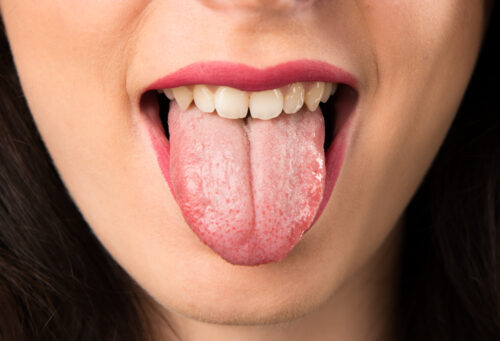
Although the teeth and gums are often associated with oral health, your tongue also plays a critical role. Please continue reading to learn how your tongue can indicate changes in your oral health and why scheduling an appointment with our seasoned general dentistry/dentists located in Basking Ridge & Morristown, NJ, is in your best interest.
What is Your Tongue Telling You About Your Oral Health?
If you notice any physical changes to the tongue, it could indicate various health issues. The following are some common changes to look out for and what they may be telling you about your overall oral health:
- White spots: If you see wet or creamy white spots on your tongue, you may have a type of fungal infection called thrush. Thrush occurs from an imbalance of mouth bacteria. A lace-like appearance can indicate you have lichen planus, an autoimmune disorder that attacks the tissue in your mouth. If the bumps feel hard and have a flat appearance that you can’t scrape away, it may be linked to oral cancer. It’s important to note that your tongue may look too white or light in color due to dehydration. Therefore, mentioning any concerns to your dentist if you see white spots or discoloration is crucial.
- Bumps: You may notice small bumps on your tongue. Depending on the location, bumps larger than the typical papillae may be transient lingual papillitis. These small, red bumps form on the tip of your tongue and often occur in response to irritation. If the bump is small, dark reddish, and is located on the underside of your tongue, it may be canker sores. If multiple small bumps cover your tongue, it could be a sign of a virus. However, if you experience pain from a bump on your tongue that doesn’t go away within a few days, you should schedule an appointment with your dentist.
- “Hairy” tongue: If your tongue looks like dark fur, this condition is caused by dead skin cells that have built up on your papillae. These cells usually have a black, brown, or white fur-like appearance and can become long strands that trap food particles, bacteria, tobacco, and other substances. This oral health issue can usually be prevented by practicing good oral hygiene, including brushing your tongue daily and using a scraper.
- Burning sensation: If your tongue feels burning, it could result from an infection, acid reflux, dry mouth, or simply consuming hot or acidic foods. However, if the sensation persists, it could indicate an issue with your nervous system. As such, it’s crucial to consult your dentist if the burning sensation doesn’t go away.
- Smooth or shiny tongue tissue: While your tongue should have a somewhat bumpy appearance, if it appears too soft or overly shiny, it could mean you have a fungal infection. This can cause your tongue to burn and itch. It could also indicate a nutritional deficiency, Celiac disease, or a medication side effect.
At Dental Associates of Basking Ridge, we are prepared to help you maintain your overall oral health. If you notice any changes to your tongue, please don’t hesitate to schedule an appointment with our dedicated team.






